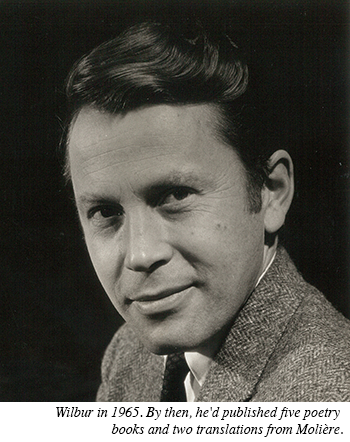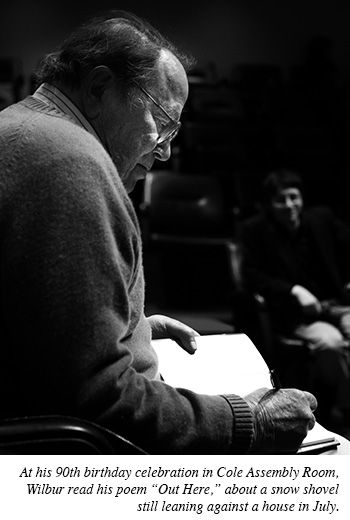
In 1947 the poet Louise Bogan reviewed, in The New Yorker, a young man’s first book of poems. “Let us watch Richard Wilbur,” she wrote. “He is composed of valid ingredients.” Those ingredients could be contradictory—the college rebel later known for his traditional formalism, the man of utter modesty unchanged by so many glittering accolades. But these ingredients remained, to the last, valid and (to quote a 1956 poem) “keeping their difficult balance.”
Richard Purdy Wilbur ’42, one of Amherst’s most distinguished and beloved alumni, died on Oct. 14 at age 96. He was the nation’s second poet laureate, a peerless translator of Molière, Racine and Corneille, and the Tony Award-nominated lyricist for Leonard Bernstein’s Candide. He also earned two Pulitzer Prizes for his meticulously passionate body of work that celebrated, to quote another poem, “the splendor of mere being.”
In summing up his life, it is impossible to resist citing his own verse. He died, for instance, in the manner he described at age 77: “in good time, the bedstead at whose foot / The world will swim and flicker and be gone.” Wilbur was living in a nursing home in Belmont, Mass., and is survived by four children (including Nathan Wilbur ’73), three grandchildren (including Liam Wilbur ’14E) and two great-grandchildren. His wife, Charlotte, known to all as Charlee—a Smith student he met while at Amherst, regularly walking or hitching the 9-mile distance to see her—died in 2007.
“He was remarkable man whose decency and humanity are as memorable as his verse,” said Amherst President Biddy Martin the day after his death. “These qualities, along with his wit and intelligence, live on in his work and in what we continue to learn from his example.”
Born in New York City in 1921 and raised in rural North Caldwell, N.J., Wilbur started at Amherst as the famous Hurricane of 1938 struck. He never forgot witnessing the devastation from North dormitory as the maples of College Grove “lay down” one by one from the gusts, as he recalled to Samuel Williston Professor of English David R. Sofield, with whom he taught poetry courses at Amherst.
Over time, Wilbur shared many stories with Sofield about his Amherst years. An English major, Wilbur pledged Chi Psi, which was full of football players. Thinking he should also try athletics, Wilbur took up boxing. When he came to the Chi Psi house one day with a black eye from sparring at the gym, a fraternity brother (and the football team’s center) pulled him aside and said, “We didn’t pledge you to be an athlete. We took you into the house to raise our academic standing.”
There wasn’t so much raising at first: Wilbur’s freshman and sophomore grades fell because he devoted excessive time to writing for The Amherst Student and Touchstone, the student literary magazine—which tagged him as “a pub-crawling, gamboling, cartooning humorist.” In both words and pictures, he was bold, often satirizing Amherst President Stanley King for bellicosity in the run-up to World War II. Wilbur was “vehemently anti-interventionist” before Pearl Harbor, explain Robert Bagg ’57 and Mary Bagg in 2017’s Let Us Watch Richard Wilbur: A Biographical Study (see review, page 48). Wilbur evencompared FDR’s lend-lease policy to a “runaway toboggan” racing toward U.S. military involvement.
But then came Pearl Harbor. Wilbur’s most famous Amherst Student editorial appeared the day after the attack. It ran on the front page, the headline blaring in large type, all caps: “NOW THAT WE ARE IN IT.”
Wrote Wilbur: “We needn’t rhapsodize over our intervention like the editor of the Williams Record, but we should suppress our obstructing doubts ... confining our thoughts to the job before us, and to the post-war world, which it will be our great pleasure to put together. Now that we are fighting, what is needed is unanimity and determined action. … If we feel any allegiance to the race in general, we will strive to make the post-war world more hopeful and less combustive than the world of the past twenty years, to which we are now bidding a noisy farewell.”

